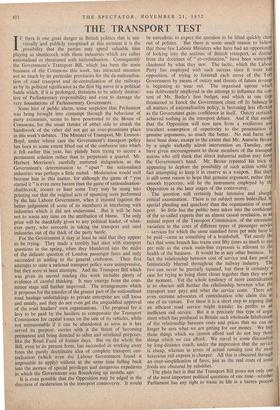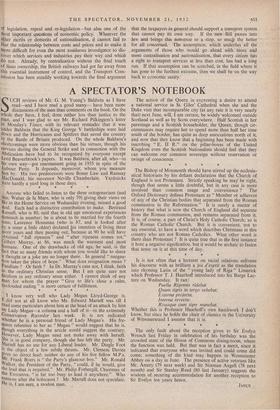THE TRANSPORT TEST
IF there i's one great danger in British politics that is uni- versally and publicly recognised at this moment it is the possibility that the parties may spend valuable time playing at shuttlecock with those industries which are either nationalised or threatened with nationalisation. Consequently the Government's Transport Bill, which has been the main business of the Commons this week, has attracted attention not so much by its particular provisions for the de-nationalisa- tion of road transport and de-centralisation of the railways as by its political significance as the first big move in a political battle which, if it is prolonged, threatens to be utterly destruc- tive of Parliamentary responsibility and even to damage the very foundations of Parliamentary Government.
Some hint of public alarm, some suspicion that Parliament was being brought into contempt through the behaviour of party extremists, seems to have penetrated to the House of Commons, for the usual threats of either side to smash the handiwork of the other did not get an over-prominent place in this week's debates. The Minister of Transport, Mr. Lennox- Boyd, under whose care the Government's transport policy has been to some extent lifted out of the confusion into which it fell earlier this year, has plainly been trying to secure a permanent solution rather than to perpetuate a quarrel. Mr. Herbert Morrison's carefully nurtured indignation at the Governnient's determination to " upset " the nationalised industries was perhaps a little muted. Moderation would well become him in this matter, for although the game of "you started it " is even more barren than the game of nationalisation- shuttlecock, sooner or later some Tory may be stung into pointing out that the original acts of upsetting were performed by the. late Labour Government, when it insisted (against the better judgement of some of its members) in interfering with industries which it did not understand. But it will be best not to waste any time on the attribution of blame. The only prize will be thankfully given to any political leader, of what- ever party, who succeeds in taking the transport and steel industries out of the thick of the party battle.
For the Government it may at least be said that they appear to be trying. They made a terribly bad start with transport questions in the spring, when they blundered into the midst of the delicate question of London passenger fares and only succeeded in adding to the general confusion. Their first attempts to state a national transport policy were unimpressive, but they were at least attempts. And the Transport Bill which was given its second reading this week includes plenty of evidence of careful thinking. It may emerge from the com- mittee stage still further improved. The arrangements which it proposes for the transfer of the greater part of the nationalised road haulage undertakings to private enterprise are still loose and untidy, and they do not even get the unqualified approval of the road hauliers' own organisations. The proposal for a levy to be paid by the hauliers to compensate the Transport Commission for capital losses on the sale of its vehicles, while not unreasonable if it can be abandoned as soon as it has served its purpose, carries with it the threat of becoming permanent and being directed to other and unrelated purposes, like the Road Fund of former days. But on the whole the Bill, even in its present form, has succeeded in working away from the purely doctrinaire idea of complete transport cen- tralisation (which even the Labour Government found it impossible to apply)' without at the same time falling back into the morass of special privileges and dangerous expedients in which the Government was floundering six months ago. It is even possible that the Opposition may be edged in the direction of moderation in the transport controversy. It would be unrealistic to expect the question to be lifted quickly clear out of politics. But there is some small reason to belieVi that those few Labour Ministers who have had an opportunity of looking into the realities of British transport, as distinct from the doctrines of " co-ordination," have been somewhat chastened by what they saw. The tactic, which the Labour Party has employed with 'such success since it went into opposition, of trying to forestall each move of the Tory Government by means of outcry and threats of future revenge is beginning to wear out. The organised uproar which was deliberately employed in the attempt to influence the con- tent of Mr. Butler's first budget, and which at one time threatened. to knock the Government clean off its balance in all matters of nationalisation policy, is becoming less effective as the Government gains confidence in itself. Outcry certainI achieved nothing in the transport debate. And if that means that the Opposition will now turn from a vociferous and truculent assumption of superiority to the presentation of genuine arguments, so much the better. No real harm will have been done, except to the extent that Mr. Aneurin Bevan. by a single wickedly adroit intervention on Tuesday, ,may have given encouragement to those members of the transport unions who still think that direct industrial action may force the Government's hand. Mr. Bevan repeated his trick of appearing to deplore the possibility of such action while in fact attempting to keep it in reserve as a weapon. But ther0 is still some reason to hope that genuine argument, rather than smooth hypocrisy, will be the instrument employed by the Opposition in the later stages of the controversy.
The question will certainly bear intensive and sharpli critical examination. There is no subject more bedevilled 1;1 special pleading and quackery than the organisation of trans port. So little has the public- been taken into the confidence of the so-called experts that an almost casual revelation, in an annual report of the Transport Commission, of the enormous variation in the costs of different types of passenger service —services for which the same standard fares per mile have to be paid—came as something of a bombshell. Yet surely the fact that some branch line trains cost fifty times as much to run per mile as the crack main-line expresses is relevant to the health of the business. It would be in any other business. /11 fact the relationship between cost of service and fare paid is fantastically blurred throughout the railway industry. The two can never be precisely equated, but there is certainly a case for trying to bring them closer together than they are at the moment. Yet the whole tendency of more centralisation is to obscure still further the relationship between what the transport user pays and what the service costs. There are even extreme advocates of centralisation who claim this as one of its virtues. For these it is a short step to arguing that an efficient road service might transfer its profits to an inefficient rail service. But it is precisely this type of argu• ment which has produced in Britain such wholesale falsification of the relationship between costs and prices that we can no longer be sure what we are getting for our money. We buy those things which we cannot afford and do not buy those things which we can afford. We travel in some discomfort by long-distance coach, under the impression that the service is cheap, whereas in terms of actual running cost the most luxurious rail express is cheaper. All this is obscured through an over-simplification of fares, just as the real costs of some foods are obscured by subsidies. The plain fact is that the Transport Bill poses not only one of the most important political questions of our time—whether Parliament has any right to waste its life in a barren process of legislation, repeal and .re-legislation—but. also one of the most important .questions of economic policy. Whatever the Other merits or demerits of nationalisation, it cannot fail to blur the relationship between costs. and prices and to make it More difficult for even the most assiduous investigator to dis- cover which services and industries pay their way and which do not. Already, by centralisation without the final touch of State ownership, the British railways had got far away from this essential instrument of control, and the Transport Com- mission has been steadily working towards the final argument that the taxpayers in general should support a transport system that cannot pay its .own way. If the new •Bill passes into law and brings this nonsense to a stop, so mug) the better for' all 'concerned. 'The assumption, which underlies all the arguments of those whoa would go ahead with more and more centralisation and .nationalisation, that every citizen has a right to transport services at less than cost, has had a long run. If that assumption can. be scotched, in the field where it has gone to the furthest extreme, then we shall be on the way back to economic sanity:











































































 Previous page
Previous page